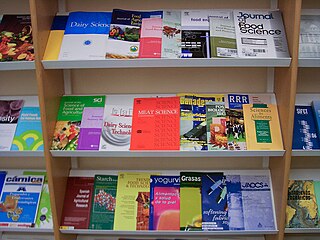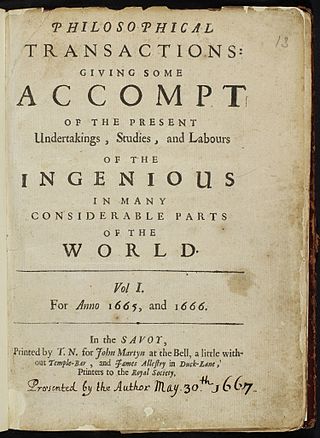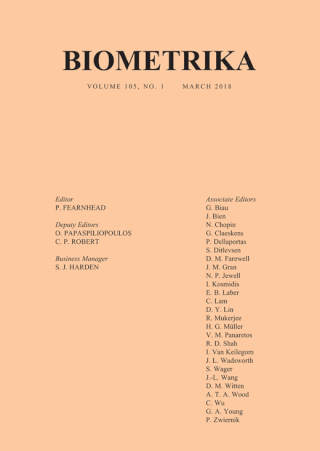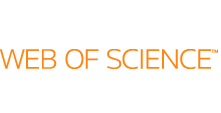
A citation is a reference to a source. More precisely, a citation is an abbreviated alphanumeric expression embedded in the body of an intellectual work that denotes an entry in the bibliographic references section of the work for the purpose of acknowledging the relevance of the works of others to the topic of discussion at the spot where the citation appears.

Academic publishing is the subfield of publishing which distributes academic research and scholarship. Most academic work is published in academic journal articles, books or theses. The part of academic written output that is not formally published but merely printed up or posted on the Internet is often called "grey literature". Most scientific and scholarly journals, and many academic and scholarly books, though not all, are based on some form of peer review or editorial refereeing to qualify texts for publication. Peer review quality and selectivity standards vary greatly from journal to journal, publisher to publisher, and field to field.

An academic journal or scholarly journal is a periodical publication in which scholarship relating to a particular academic discipline is published. They serve as permanent and transparent forums for the presentation, scrutiny, and discussion of research. They nearly universally require peer review for research articles or other scrutiny from contemporaries competent and established in their respective fields.

Scientific literature encompasses a vast body of academic papers that spans various disciplines within the natural and social sciences. It primarily consists of academic papers that present original empirical research and theoretical contributions. These papers serve as essential sources of knowledge and are commonly referred to simply as “the literature” within specific research fields.

A citation index is a kind of bibliographic index, an index of citations between publications, allowing the user to easily establish which later documents cite which earlier documents. A form of citation index is first found in 12th-century Hebrew religious literature. Legal citation indexes are found in the 18th century and were made popular by citators such as Shepard's Citations (1873). In 1961, Eugene Garfield's Institute for Scientific Information (ISI) introduced the first citation index for papers published in academic journals, first the Science Citation Index (SCI), and later the Social Sciences Citation Index (SSCI) and the Arts and Humanities Citation Index (AHCI). American Chemical Society converted its printed Chemical Abstract Service into internet-accessible SciFinder in 2008. The first automated citation indexing was done by CiteSeer in 1997 and was patented. Other sources for such data include Google Scholar, Microsoft Academic, Elsevier's Scopus, and the National Institutes of Health's iCite.
The impact factor (IF) or journal impact factor (JIF) of an academic journal is a scientometric index calculated by Clarivate that reflects the yearly mean number of citations of articles published in the last two years in a given journal, as indexed by Clarivate's Web of Science.

Biometrika is a peer-reviewed scientific journal published by Oxford University Press for the Biometrika Trust. The editor-in-chief is Paul Fearnhead. The principal focus of this journal is theoretical statistics. It was established in 1901 and originally appeared quarterly. It changed to three issues per year in 1977 but returned to quarterly publication in 1992.
Scientific writing is writing about science, with an implication that the writing is by scientists and for an audience that primarily includes peers—those with sufficient expertise to follow in detail. Scientific writing is a specialized form of technical writing, and a prominent genre of it involves reporting about scientific studies such as in articles for a scientific journal. Other scientific writing genres include writing literature-review articles, which summarize the existing state of a given aspect of a scientific field, and writing grant proposals, which are a common means of obtaining funding to support scientific research. Scientific writing is more likely to focus on the pure sciences compared to other aspects of technical communication that are more applied, although there is overlap. There is not one specific style for citations and references in scientific writing. Whether you are submitting a grant proposal, literature review articles, or submitting an article into a paper, the citation system that must be used will depend on the publication you plan to submit to.

Management Information Systems Quarterly, referred to as MIS Quarterly, is an online-only quarterly peer-reviewed academic journal that covers research in management information systems and information technology. It was established in 1977 and is considered a major periodical in the information systems industry. An official journal of the Association for Information Systems, it is published by the Management Information Systems Research Center at the University of Minnesota. The current editor-in-chief is Andrew Burton-Jones, University of Queensland.

Public Understanding of Science is a bimonthly peer-reviewed academic journal established in 1992 and published by SAGE Publications. It covers topics in the popular perception of science, the role of science in society, philosophy of science, science education, and science in public policy. The editor-in-chief is Hans-Peter Peters.
IEEE Intelligent Systems is a bimonthly peer-reviewed academic journal published by the IEEE Computer Society and sponsored by the Association for the Advancement of Artificial Intelligence (AAAI), British Computer Society (BCS), and European Association for Artificial Intelligence (EurAI).

The Web of Science is a paid-access platform that provides access to multiple databases that provide reference and citation data from academic journals, conference proceedings, and other documents in various academic disciplines.

Astrophysics and Space Science is a bimonthly peer-reviewed scientific journal covering astronomy, astrophysics, and space science and astrophysical aspects of astrobiology. It was established in 1968 and is published by Springer Science+Business Media. From 2016 to 2020, the editors-in-chief were both Prof. Elias Brinks and Prof. Jeremy Mould. Since 2020 the sole editor-in-chief is Prof. Elias Brinks. Other editors-in-chief in the past have been Zdeněk Kopal (1968–1993) and Michael A. Dopita (1994–2015).

The Journal of Alternative and Complementary Medicine is a monthly peer-reviewed medical journal covering alternative medicine published by Mary Ann Liebert. It was established in 1995 and is the official journal of the Society for Acupuncture Research. The editor-in-chief is John Weeks, who succeeded the founding editor, Kim A. Jobst.
Today in China, there are more than 8,000 academic journals, of which more than 4,600 can be considered scientific. About 1,400 cover health science. In 2022, it was reported that China has become one of the top countries in the world in both scientific research output, and also for highly cited academic papers.

Data & Knowledge Engineering is a monthly peer-reviewed academic journal in the area of database systems and knowledge base systems. It is published by Elsevier and was established in 1985. The editor-in-chief is P.P. Chen.

Family Process is a quarterly peer-reviewed academic journal covering research on family system issues, including policy and applied practice. It is published by Wiley-Blackwell on behalf of the Family Process Institute. Since 2007, the journal publishes its abstracts in Chinese and Spanish in addition to English. The journal publishes original articles, including theory and practice, philosophical underpinnings, qualitative and quantitative clinical research, and training in couple and family therapy, family interaction, and family relationships with networks and larger systems.
Frontiers: A Journal of Women Studies is a triannual peer-reviewed academic journal which figures among the earliest publications in the field of feminist and gender studies in the United States. First published in 1975, at the University of Colorado, Boulder, Frontiers takes pride in its extensive, interdisciplinary agenda concerned with the intersections of the different systems of oppression that produce and reproduce social inequalities and injustices.
Metascience is the use of scientific methodology to study science itself. Metascience seeks to increase the quality of scientific research while reducing inefficiency. It is also known as "research on research" and "the science of science", as it uses research methods to study how research is done and find where improvements can be made. Metascience concerns itself with all fields of research and has been described as "a bird's eye view of science". In the words of John Ioannidis, "Science is the best thing that has happened to human beings ... but we can do it better."
Worldviews on Evidence-Based Nursing is a bimonthly peer-reviewed nursing journal covering research on nursing practice. It is published by Wiley and was established in 1993 as The Online Journal of Knowledge Synthesis for Nursing. The founding editors-in-chief were Donna Knauth and Jacqueline Fawcett. It is the official journal of the Honor Society of Nursing, Sigma Theta Tau International, and its current editor-in-chief is Bernadette Mazurek Melnyk.











